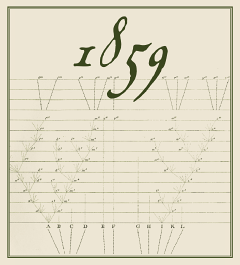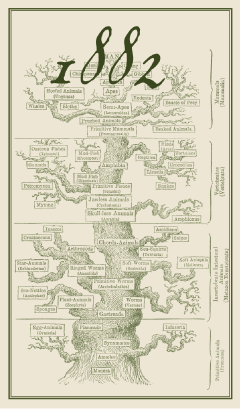 |
 |
The Origin and Response
When Charles Darwin arrived home in 1836, he chose not to publish the ideas he had gleaned from his voyage. Instead he contemplated what he had seen, starting his first evolution note-book in 1837. His reading of An Essay on the Principle of Population by Rev. T.R. Malthus suggested circumstances under which favorable variations in a species would tend to be preserved. As each generation of life strove to populate and consume, only those best fitted to the environment were likely to have offspring. In June of 1842, Darwin wrote a 35 page brief abstract of his theories, and with encouragement of his friends, wrote a 230 page expansion of his ideas in the summer of 1844. Darwin's eventual plan was for a multi-volume essay laying out his ideas and examples. The arrival of a letter from Alfred Russell Wallace in the summer of 1858 changed his sedate pace. Wallace, a naturalist working overseas in the Malay Peninsula, asked for Darwin's opinion on Wallace's own ideas about natural selection. This letter prompted Darwin to present Wallace's letter and a selection from Darwin's own unpublished notebooks simultaneously at the July 1, 1858 meeting of the Linnean Society of London. The positive scientific reception of these ideas compelled Darwin to publish On the Origin of Species on November 22, 1859 in a first edition of 1,250 copies. Prior to 1859, the concept of evolution was known by people, but generally not accepted by serious thinkers. The publication of The Origin changed all that. It was the subject of constant comment in magazines and newspapers as well as scientific societies, and also became the crux of many arguments between scientific and religious figures. Most of the popular arguments centered on the discussion of how man evolved and man's link to apes. Darwin himself responded to these arguments by writing in 1871 The Descent of Man, and Selection in relation to Sex.
| ||||
| ||||

 Click Image to Zoom
Click Image to Zoom









 individuals having any advantage however slight over others, would have the best chance of surviving and procreating their kind.
individuals having any advantage however slight over others, would have the best chance of surviving and procreating their kind.
